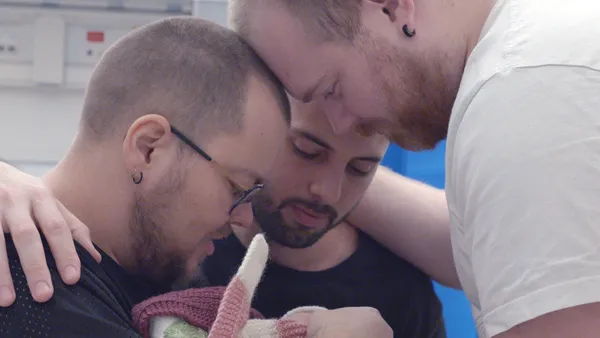Eye For Film >> Movies >> Fatherhood (2025) Film Review
Fatherhood
Reviewed by: Jennie Kermode

As a gay man, Sindre never expected that parenting would be a part of his life. For his part, David never anticipated that his attraction to men would be consistent regardless of genitals. As this documentary opens, the two of them are standing behind a screen, eagerly looking over it to where their partner, Kris, is getting an ultrasound scan. On a monitor, they can see the wriggling grey shape of their baby. A dial is turned, and they can hear its heartbeat.
This is an enormous moment for any prospective family, but these three men have had a harder than average struggle to get there. As the film unfolds, letting us get to know them as a family, it also reflects on that struggle and Kris’ lawsuit against the hospital where, despite having always wanted children, he was sterilised – a requirement of Norwegian law at the time in order for him to get gender confirming surgery and be legally recognised as a man. The pregnancy we follow in the film was made possible only by way of a donor egg, and at considerable expense. They also had to travel to Finland to get it implanted.
Filmmakers looking to tell stories like this often shun people perceived as having more than one ‘issue’, so it’s refreshing to see directors August B Hanssen and Even G Benestad take on his subjects just as they are. Although the original title (Tre Fedre) puts polyamory front and centre, it doesn’t get much of a mention in the film itself, except for one conversation about the awkwardness of explaining it to a work colleague when one really doesn’t want it to be a big deal. The men are obviously comfortable together and that’s that. The fact that there are three of them does, however, enable Hanssen and Benestad to compare and contrast their approaches to the situation in more depth than if there had been just two. David explains that Kris is the brains of the outfit, Sindre is the sensitive one and he, being childish himself, will be the fun, playful parent.
Few families comprise of just parents and child, and indeed there are grandparents in the picture here too, getting their turn to share their thoughts, along with assorted other relatives who keep a little more distance. We learn about the death in childhood of Kris’ brother and it’s easy to imagine how the sterilisation must have added to his parents’ sorrows in that situation, so for them this pregnancy is all the more meaningful. As the fathers-to-be go through the inevitable anxieties that accompany taking on responsibility for a child, the grandparents are there to offer gentle advice and support.
There is darkness in the film too, and not just in relation to the sterilisation. Kris’ pregnancy coincides with the 2022 terrorist attack on Oslo Pride, in which a gunman killed two people and left another nine seriously wounded. Just for being who they were, the men reflect. It’s the sort of thing that becomes all the more disturbing when bringing a child into the world. But the longing for family runs deep, and people keep on living: these three are no different. We watch them fixing up the kid’s room, discussing their different views on christening, and wondering, as fathers frequently do, what age the kid will have to be before it’s ready for The Hobbit to be read as a bedtime story.
Despite the anger at the unfairness of what has gone before, this is ultimately a warm-hearted, life-affirming film. It’s refreshing in its willingness to take on matters often presented as sensational or complicated and, by getting up close, remind us just how simple they really are.
Reviewed on: 31 Mar 2025















